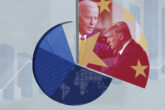January 23, 2019
What Pressuring Russian Oligarchs Accomplishes
By Neil Bhatiya:
As Congress and the administration consider measures to push back on Russian malign activity in 2019, they need to understand what little influence oligarchs are likely to have on Russia’s foreign policy decisionmaking. Russian businessmen participate in the global economy because Russia’s political leadership allows it. Self-preservation prevents oligarchs from attempting to change Putin’s mind about his foreign policy course of action, which is what many in Washington seem to believe is the underlying theory of oligarch sanctions. Despite these limitations, however, there is utility in barring such actors from the global financial system.
In 2018, the saga around ongoing sanctions on Russian aluminum company RUSAL and its parent company EN+ dominated the U.S. effort to impose sanctions on Russian oligarchs. Oleg Deripaska, whom the Treasury Department sanctioned in April for myriad illicit activity, and for essentially acting in his business operations as an arm of the Russian state, controlled these firms. The effects of sanctioning RUSAL were immediate and disruptive. The international aluminum market relies on supplies from RUSAL, which maintains global operations, including in advanced Western economies like Ireland. The market crashed the Monday after the RUSAL designation. The issuance of a general license to other firms for unwinding business was widely seen as a climbdown by Treasury, allowing Deripaska to give up his control in exchange for RUSAL’s planned de-listing this month.
Enforcing financial transparency and human rights norms by targeting certain Russian business leaders will not cause a sea change in Moscow’s foreign policy. It is, however, highly disruptive and highlights bad actors in the financial system, particularly those who may be involved in human rights violations or corruption.
It would be wrong, however, to conclude that Treasury will shy away from further targeting oligarchs or their business operations, even in the cases where their firms are important for the wider global economy. It is highly likely that sanctions implementers were impressed by the magnitude of the disruption that sanctions on Rusal caused and are looking for additional targets among the economic elite in Russia.
Congress, with a Democratic-led House of Representatives, feels a strong political incentive to punish Russia with new sanctions authorities. The bipartisan demand for accountability is fueled in large part by the president’s conduct. Members on both sides of the aisle have criticized Trump’s apparent willingness to defer to Russian President Vladimir Putin’s claims of innocence with regard to U.S. election interference, his continued support of Bashar al-Assad, and his support of the assassination of regime enemies using chemical weapons.
While ejecting oligarchs from the global economy may not lead Putin to change his mind about how to treat Ukraine, such action can be beneficial to U.S. interests even if it does not change the Russian government’s calculations about what is in its national interest. While not all figures who would be considered oligarchs take part in illegal activity, many of those targeted to date by sanctions do, and barring them from interacting with the U.S. financial system is a positive end.
Enforcing financial transparency and human rights norms by targeting certain Russian business leaders will not cause a sea change in Moscow’s foreign policy. It is, however, highly disruptive and highlights bad actors in the financial system, particularly those who may be involved in human rights violations or corruption. As long as those who are designing and implementing sanctions are realistic about limitations, and are able to manage expectations, they can preserve a very powerful tool for raising the costs of the status quo for Russia’s elite, while also minimizing collateral damage.
Neil Bhatiya is the Research Associate for the Energy, Economics, and Security Program at the Center for a New American Security. His work focuses on the geopolitics of energy, climate change, and tools of economic statecraft.
Read the full CNAS "U.S. Strategies to Counter Russia" commentary series below:
Embedding Sanctions in U.S. Russia Strategy
- Edward Fishman, "Russia Sanctions in 2019: Clarifying a Strategy"
- Peter Harrell, "The Goals of Sanctioning Russia"
Prospects for Transatlantic Cooperation on Russia Policy
- John Hughes, "The U.S. & Europe May Return to Common Sanctions Policies on Russia"
- Elizabeth Rosenberg, "U.S. Policy Toward Russia and a Deepening Transatlantic Divide"
- Rachel Rizzo, "Europe and the United States: A Diverging Approach Toward Russia?"
Russian Domestic Politics and Greater Russia-China Cooperation
- Neil Bhatiya, "What Pressuring Russian Oligarchs Accomplishes"
- Ashley Feng, "China-Russia Cooperation Presents a Fresh Threat to the United States"
- Andrea Kendall-Taylor, "U.S. Russia Policy: Moving Beyond Sanctions"
Russia’s Macroeconomic Vulnerabilities
- Sam Dorshimer, "Considering Sanctions on Russian Sovereign Debt"
- Rachel Ziemba, "Russia’s Resiliency Toolkit"
More from CNAS
-
BONUS: Comparing China Sanctions Under Trump and Biden
Join Emily Kilcrease and researcher Eleanor Hume to discuss the latest edition of CNAS's Sanctions by the Numbers series, examining how the U.S.'s sanctions policy on China ha...
By Emily Kilcrease & Eleanor Hume
-
How Donald Trump Could Undermine the U.S. Dollar
The point here isn’t that sanctions can’t hurt the dollar — they can. But the real danger is misuse rather than overuse....
By Edward Fishman
-
Sanctions by the Numbers: Comparing the Trump and Biden Administrations’ Sanctions and Export Controls on China
Executive Summary The Biden administration has exceeded the Trump administration in the number of financial sanctions and entity-based export controls placed on Chinese person...
By Eleanor Hume & Rowan Scarpino
-
A Fight Among China Hawks Could Imperil U.S. AI Dominance
Rolling the dice now on partnerships like the G42 deal could be critical to ensuring U.S. dominance....
By Daniel Silverberg & Elena McGovern




